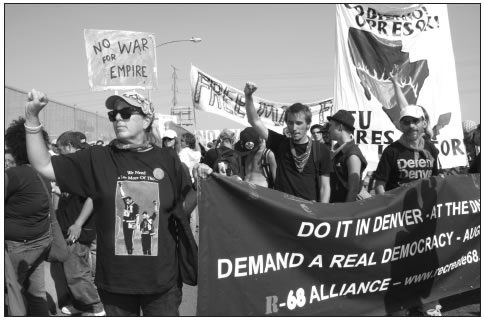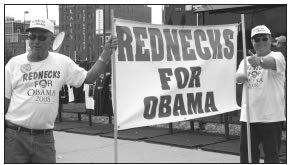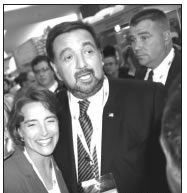Do political conventions have any real reason to exist?
Probably not, as was demonstrated by the Republicans this month, when they scaled back their convention because Hurricane Gustav was hitting the Gulf Coast.
The parties’ candidates are chosen during primaries and caucuses, so the huge gatherings are an anachronism.

Protesters seized the occasion of the convention to demonstrate against everything from criminal marijuana laws to the Iraq War. Photo by Wendy Mimiaga.
But they’re likely to continue for some time because, well, they’re fun.
Four of us from the Free Press decided to head to Denver for the Democratic National Convention Aug. 25-28. Here are some random observations, not in any way objective, about the big event.
Getting there
A huge part of the adventure, for me, turned out to be the challenge of getting a semi-disabled husband to and from the Pepsi Center, where the convention was held. David, whose spine is basically collapsing, can walk with a cane, but isn’t up to long hikes.
The convention was touted as the most accessible ever. Well, maybe.
On Sunday, the day before the convention, we scoped out the situation. We drove from Colorado Springs, where we were staying, to the southernmost stop on the RTD light rail, then rode that into downtown Denver. We got off at the 16th Street Mall, where a free shuttle will carry you up and down 16th.
Except that when we plopped down in the shuttle, nothing happened. After 10 minutes, a woman stuck her head in and proclaimed, “They aren’t running the shuttle today, so you better all get off!”
It was six or eight blocks to the Sheraton, where we were to pick up our credentials. By the time David had wobbled into the Sheraton, weaving between pedestrians, cyclists, protesters, street vendors, and police, he was sweating so hard that a bellboy rushed to get him a glass of water lest he collapse on the spot.
After securing the precious credentials, I asked various convention volunteers the best way for us to get to the Pepsi Center on Monday. No one knew. There were rumors of free shuttle buses from the major hotels, but no one was certain.
One woman handed me a downtown map. “Get off at the Union Station stop and walk to the center,” she advised, drawing a straight line across what appeared to be a few blocks. Ha, ha!
Seeking Shangri-La
On Monday we left the light rail at Union Station and met up with our colleagues, Jim and Wendy, who were staying in Fort Collins. We started walking toward the Pepsi Center. And walking. And walking. Because of security measures, many streets around the center were closed to vehicle traffic. Everyone had to enter by a single entrance, and it was on the opposite side from our position.
After 45 minutes, we were still nowhere near the entrance, and David was in such pain that we left him on a bench while we sought another way to get him to the center, which was beginning to seem as elusive as Shangri-La.
It took more hard hiking before we could stand in line to be searched and X-rayed. Then there was another good walk before we were actually inside the center amid the melee.
I asked half a dozen people for help transporting my husband. No one had any real suggestions. I was sent to a parking lot a half-mile away in quest of a shuttle; no one there knew anything about it. Finally, back in the center, I elbowed my way to the “accessibility” desk and talked to a harried woman
“Look,” I said, “my husband has been sitting on a bench in the middle of nowhere for an hour!”
“Oh!” she cried, suddenly stricken. “Just take a wheelchair.”
So Jim and I trundled the wheelchair a mile along city streets to David sitting patiently on his bench, then pushed him all the way back.
The next day I flagged down a woman pedaling a “pedi-cart,” a sort of bicycle rickshaw, but she said she couldn’t transport us to the center.
“I have to wait for Darryl Hannah,” she said.
Can’t Darryl Hannah walk? I wanted to snap. But I left David on the bench again (he got a nice photo of Darryl, too!) while I again went for a wheelchair. This time the ADA folks were cagier. They didn’t want me to take the chair outside the center. “We had 10 of them disappear last night,” they said.
But I was insistent, so I managed to secure a chair that day.
On Wednesday it was apparent no wheelchairs were leaving the Pepsi Center. Miraculously a volunteer driving a golf cart gave us a lift over the final stretch.
Blind leading the blind
The nadir of our transportation adventure came Monday evening. After the night’s speeches, we stood in the handicapped line to board a shuttle bus taking people to hotels and lightrail stops downtown.
Great — except the driver barely knew how to drive a bus, and he was being guided by an out-of-town police officer poring over a map and saying, “Turn right at the next corner, I think.”
Slowly, slowly the shuttle steered along. After half an hour of driving, we had completed a giant circuit of the Pepsi Center. The bus was packed with happy delegates, so busy talking they hadn’t noticed we had gone nowhere in all that time.
However, they began to catch on to the fact that something was amiss when the driver came to the first stop and the officer asked him, “Do you know how to open the doors?”
Luckily, he did.
“Where are we?” someone asked. “I don’t know,” the officer said.
“Does anyone recognize this stop?”
And so it went. The driver stopped at nearly every corner and people tried to figure out if they were near their hotel. Most were from out of town and didn’t know, but many exited anyway on the theory that they were better off casting about on foot than being stuck on the cursed vessel.
David once lived in Denver, so he was able to divine that we were approaching the convention center and a light-rail stop. By then he and I and another man were the only ones left on the shuttle. We’d been traveling for an hour and a half. It was midnight. My eyes were dry and exhausted, so I put on my dark sunglasses to block the cold air blasting from the bus’s vents. Beside me sat David holding his cane.
The bus pulled up at the city convention center and the police officer asked the third passenger, “Will you help these folks find the light-rail stop, since they’re visually impaired?”
After we got off, the man apologetically said he was Monroe Anderson, a political commentator for Ebony magazine and other outlets, and didn’t know Denver. “That’s all right,” I said, laughing, “we aren’t blind!”
No one listening
Despite the logistical difficulties of getting to the Pepsi Center, we enjoyed the convention.
One of the peculiarities that struck me was that almost no one listens to the speeches, except the major ones. People mill about and babble while politicians and dignitaries drone over the hubbub.
Many of the speeches were unremarkable, but there were some excellent ones that got little attention.
Unless you’re an avid TV viewer, you probably didn’t see Ohio’s Rep. Dennis Kucinich shouting, “Up with health care for all. Up with education for all,” and exhorting, “Wake up, America!”
Nor did you catch Montana Gov. Brian Schweitzer giving a fiery speech about energy policy.
He ridiculed John McCain’s plan to boost domestic oil-drilling, saying, “You can’t drill your way to energy independence, not even if you drilled in all of John McCain’s backyards — even the ones he doesn’t know he has,” a line that drew a huge roar.
And John Kerry, the failed Democratic presidential candidate from 2004, gave a kick-ass speech lambasting everything from the Bush administration’s use of torture to Karl Rove’s cutthroat campaign tactics. He drew a sharp contrast between “Senator McCain” and the new “candidate McCain,” who supports many of the things he criticized as a senator.
But the days when citizens would listen to Abraham Lincoln and Stephen Douglas debate for hours are long gone. Not even the press heeded what was being said unless it was by one of the Obamas or Clintons. Laptops sat in rows on press tables, many unattended, others being used to surf the Net.
But during the “big” speeches everyone would crowd into seats, and afterwards, the celebrity journalists on CNN, MSNBC and Fox would pore over each line spoken by Hill or Bill as eagerly as 1960s potheads used to examine Beatles songs for hidden meanings.
Something new
If self-importance could be measured, the weight of it contained in the Pepsi Center that week probably exceeded the mass of the planet Jupiter. People fought to get on elevators first, dodged through crowds as if the fate of the world depended on their actions, and shamelessly namedropped: “I will have to ask Hillary about that and get back to you. . .”
Reporters roved the corridors of the Pepsi Center, desperately searching for something new, something different, something unscripted to offer their jaded readers or viewers.
“I like to write long,” a journalist told me, “but you have to adapt. I just put a few paragraphs on my blog, then a link to something, maybe a photo.”
New technology was plenty in evidence at the convention. Reporters shouted into cell phones, sent texts with one hand while typing on a laptop with the other, watched live telecasts of the convention on their computers even as the real thing was happening before their eyes.

Barack Obama drew a variety of supporters to the 16th Street Mall in Denver. Photo by Wendy Mimiaga.
Yet, for all the gizmos, I wondered whether anything would be written that would match Hunter Thompson’s masterful coverage of the 1972 McGovern campaign — pecked out on a clunky typewriter.
Traditional journalists wavered between the goal of objectivity and the need to voice their feelings. One man from Iowa City who waited beside us to get on a shuttle told me, “I try to maintain neutrality, but I have to say, I think Cindy McCain is a freak.”
It was mostly the bloggers and alternative- newspaper writers who got out to report on the events outside the Pepsi Center. One young Austin, Texas, journalist who marched with us alongside a protest Thursday said, “The mainstream press are all sitting in the f—ing sports bars getting plowed and watching Olbermann [on MSNBC].”
Musical selections
Certainly there were two conventions: one in the Pepsi Center, one outside. The latter was unorganized and chaotic, but lively. Protesters marched along 16th Street, disrupting the shuttle and carrying signs of every sort. Many supported Obama, but some opposed him. “Phew! Who wants B.O. in the White House?” read one. A big yellow “Jesus Saves” sign was carried up and down the street day after day by various plucky people.
Musicians on the mall included groups with some talent, and random solo artists such as one guitarist singing apparently impromptu lyrics: “When the president talks to God/they drink their beer and they go play golf.”
The choice of songs inside the Pepsi Center interested me. For Michelle Obama, the band played Stevie Wonder’s “Isn’t She Lovely?”, which I thought rather sexist.
Naturally, most tunes were upbeat. Tuesday night included a pumped-up version of “I’m So Excited.” A man in the Colorado delegation wearing a big white cowboy hat and looking an awful lot like Sen. Ken Salazar was dancing along enthusiastically.
Bill Clinton, of course, got “Don’t Stop Thinking About Tomorrow.” The applause throughout Hillary’s speech was so loud and sustained, I couldn’t tell what the band was playing. I had to watch her speech later on TV to understand everything she had said.
During one interlude Wednesday, Melissa Etheridge played a medley that included Bruce Springsteen’s “Born in the USA.” Over and over she played the phrase. “What about the people who weren’t?” David asked me.
Evidently there were rumors that Springsteen and Jon Bon Jovi might appear, because at one point a pair of foreign journalists set a camera beside us and rehearsed a piece in which those two musicians’ names were repeated. The journalists spoke in a Slavic language. The on-camera guy could not get his tongue around Bon Jovi’s name. Every time he came to that part in his piece, he would stumble, and the cameraman would repeat, “Jon Bon Jovi! Bon! Bone! Bon appetit!”
Finally the reporter was able to get through his statement, concluding with, “from Denver, Colorado!”
Green team
The Democratic National Convention was touted as the greenest ever, and it may have been. In the Pepsi Center, when you went to throw away the bottle from your $4 soda, you couldn’t find a wastebasket. Instead, there were bins labeled Landfill, Recycle, and Compost, and an assistant told you which to use.

New Mexico Gov. Bill Richardson addresses reporters in the crowded hall at the Pepsi Center. Photo by Wendy Mimiaga.
A woman we met on the light rail was with the “green convention” effort. “On the first day, we had 25,000 people her,” she told us proudly, “and only 300 pounds of trash went to the landfill. That’s fantastic.”
Weed, not war
On Thursday, the day of Obama’s big speech at Invesco. David stayed home, so I walked with Jim and Wendy to view a permitted protest that began in Lincoln Park. It was ostensibly against marijuana laws.
After the police announced, “We are here to assist you in asserting your First Amendment rights” the marchers took off in the direction of Invesco Field, a couple of miles away
The protesters carried signs such as “Free the weed” and “Judge me on my performance, not my pee — drug testing is legalized discrimination.”
Along the way they picked up more protesters and hangers-on, and the march became multi-purpose. There were signs supporting illegal immigrants, and a sizable contingent that was anti-war. Meanwhile, delegates were walking alongside en route to Invesco Field for Obama’s speech. They seemed puzzled by the protest.
“Why are they doing this?” one asked. “I could see having an anti-war protest at the RNC, but what does Obama want to do? End the war!”
The anti-war folks disagreed. They chanted, “President Barack/will still bomb Iraq,” Then, “It’s not just Bush, it’s the ruling class/The Democrats can kiss my ass!” Another chant: “Obama may be black/But his heart is white as crack.”
The delegates and Obama supporters, many of whom were black (24 percent of the delegates were African- American, the highest percentage in history) seemed hurt. “I don’t see why they’re mad at us,” one man grumbled.
“How many of you vote?” a delegate shouted to the protesters.
“If voting changed anything, they’d make it illegal,” a protester replied.
The pro-marijuana contingent halted on a bridge, the anti-war group caught up, and they seemed to merge, chanting, “Weed, not war! Weed, not war!”
Finally the group dispersed while the stream of happy Obama supporters poured toward Mile High.
The biggest protest occurred Wednesday, when an anti-war group of several thousand, including Iraqi War veterans and Ron Kovic (“Born on the Fourth of July”), marched on the Pepsi Center. An aide of Obama’s promised to address their concerns, and the crowd was appeased.
Black man running
Being cynical about politics is easy, but there was truly a sense of excitement at the DNC that seemed fresh and invigorating.
As I rode the light rail toward home Thursday, two women sat across from me, covered in pro-Obama buttons. I asked if they’d been to the convention.
“Sort of,” one said with a laugh.
“We didn’t have passes, but we walked up and down the streets,” the other said.
“It was a once-in-a-lifetime opportunity,” added her friend. “We just wanted to be part of history.”
And what was this history they wanted to be part of? It may have been summed up best by the ironic message on a T-shirt I spied on the mall.
It read: “Black man running — and it isn’t from the police.”








